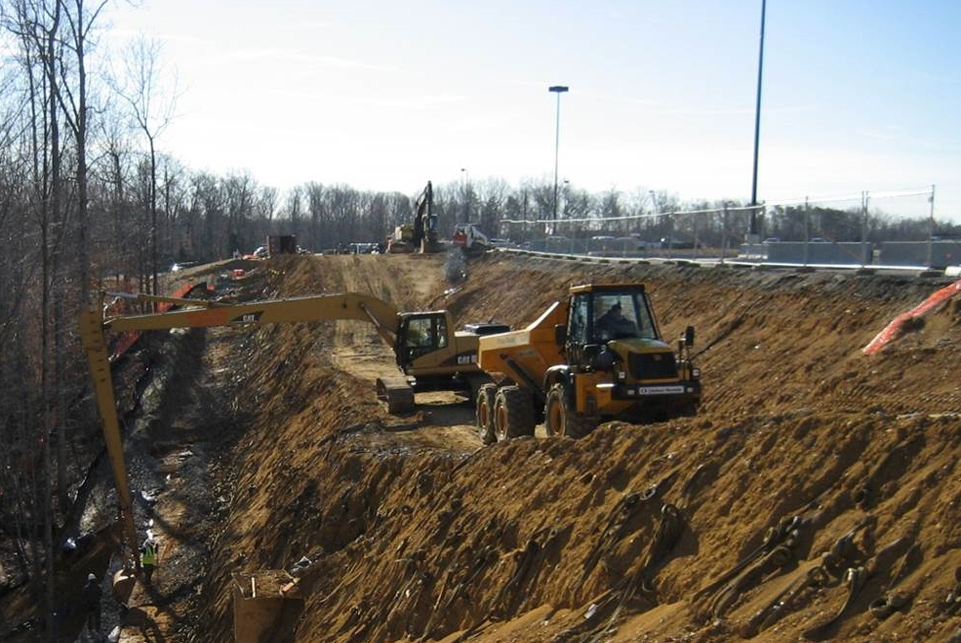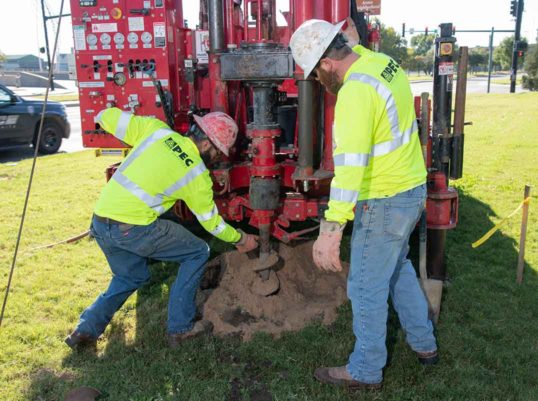A Complete Guide to Ending Up Being an Effective Geotech Engineer
A Complete Guide to Ending Up Being an Effective Geotech Engineer
Blog Article
A Detailed Introduction of the Trick Obligations of Geotechnical Designers in Website Characterization and Ground Renovation Techniques for Engineering Solutions
Geotechnical engineers are essential to the successful execution of engineering tasks, entrusted with the vital duties of website characterization and the application of ground improvement strategies. Their job entails an extensive evaluation of subsurface conditions, utilizing various screening techniques to recognize dirt and rock residential or commercial properties.
Role of Geotechnical Designers
Geotechnical engineers play a critical function in the design and construction of infrastructure by analyzing the habits of dirt and rock below the surface area - geotech engineer. Their obligations encompass reviewing subsurface problems to notify layout decisions that make certain structural stability and security. By performing detailed evaluations of soil properties, including shear leaks in the structure, compressibility, and toughness, geotechnical designers supply critical data that affects the choice of ideal construction materials and strategies
In addition to examining soil technicians, geotechnical designers are tasked with identifying potential threats such as landslides, sinkholes, and ground negotiations. Their competence assists alleviate dangers connected with these geotechnical sensations, therefore protecting both the atmosphere and public safety. They also collaborate very closely with various other engineering techniques, making sure that geotechnical considerations are integrated into total project layout.
Additionally, geotechnical designers take part in the assessment of existing frameworks, supplying suggestions for retrofitting and repairs when essential. Their extensive understanding of soil-structure interaction is crucial for the growth of sustainable facilities options. Generally, the function of geotechnical designers is essential to the successful realization of building projects, guaranteeing they are safe, long lasting, and certified with regulatory criteria.

Site Characterization Processes
Efficient site characterization procedures are necessary for recognizing the subsurface problems that influence project layout and implementation. Geotechnical engineers utilize an organized method to gather, evaluate, and analyze data concerning rock, dirt, and groundwater attributes. This process starts with a thorough testimonial of existing literature and historic site information, supplying insights into previous site conditions and prospective difficulties.

Data analysis adheres to fieldwork, where engineers make use of geostatistical methods to translate searchings for and develop geological versions. Via attentive site characterization, geotechnical designers lay the foundation for successful project execution, decreasing unanticipated problems and optimizing resource appropriation.
Soil and Rock Testing Approaches
While understanding subsurface problems is essential, the choice of proper dirt and rock testing techniques is similarly important for exact evaluation and style. Geotechnical designers employ a range of testing strategies to assess the physical and mechanical buildings of dirt and rock products.
Lab tests, such as Atterberg limits, grain dimension evaluation, and unconfined compressive stamina examinations, provide important information on dirt actions under different dampness problems and loading scenarios. These examinations assist figure out dirt category and anticipate settlement or shear stamina attributes critical for foundation design.
In-situ screening approaches, consisting of Criterion Penetration Tests (SPT), their explanation Cone Penetration Examinations (CPT), and pressure meter examinations, permit engineers to collect data directly from the ground. These techniques supply important insights into the dirt's density, consistency, and stratification without the requirement for extensive sampling.
Rock screening commonly entails core tasting and laboratory evaluation to evaluate residential properties like uniaxial compressive toughness and rock quality classification (RQD) With each other, these dirt and rock testing methods enable geotechnical engineers to make educated decisions relating to site-specific difficulties, making sure the safety and security of design options.
Ground Renovation Methods
Ground renovation techniques are necessary for boosting the engineering buildings of dirt, therefore enhancing its load-bearing capability and lowering settlement. These approaches are crucial in dealing with obstacles offered by bothersome or weak soils, which can considerably influence the security and longevity of structures.
Different ground enhancement methods are used, consisting of compaction, grouting, and dirt stablizing. Grouting, on the other hand, entails injecting a fluid material into the ground to fill up voids and boost soil communication.
Dirt stablizing incorporates a range of approaches, from chemical ingredients to mechanical treatments, focused on improving the dirt's resistance to erosion and contortion. Strategies such as lime stabilization or cement mixing alter the residential or commercial properties of the soil at a bit level, boosting its total efficiency.
Value of Geotechnical Assessments
Geotechnical evaluations play an essential role in the preparation and style of design jobs, as they provide vital details regarding the subsurface problems. Comprehending soil buildings, rock developments, groundwater degrees, and potential geohazards is essential for making sure the security and security of structures. These assessments enable engineers to make educated decisions pertaining to website option, layout criteria, and building and construction methodologies.
The relevance of geotechnical evaluations extends beyond first project phases; they contribute in danger click for info monitoring and expense efficiency. By determining prospective issues early, such as soil settlement, incline instability, or excessive groundwater, engineers can devise appropriate reduction methods, lowering the likelihood of structural failures and pricey delays. Moreover, these assessments sustain compliance with governing demands and improve the sustainability of design practices.

Final Thought
In conclusion, geotechnical designers are vital to making sure the security and stability of engineering jobs through detailed site characterization and ground renovation strategies. geo tech engineering. Their methodical method to assessing subsurface problems, incorporated with their recommendations for efficient ground adjustment, dramatically improves dirt homes and load-bearing capability. The know-how of geotechnical engineers not only helps with educated task planning however additionally makes sure compliance with laws and fosters reliable communication among stakeholders, ultimately adding to successful design end results
Geotechnical designers play a critical role in the style and building and construction of infrastructure by evaluating the actions of soil and rock underneath the surface area. By conducting comprehensive evaluations of dirt residential or commercial properties, including shear leaks in the structure, compressibility, and strength, geotechnical engineers provide important data that influences the choice of proper building and construction materials and techniques.
In enhancement to analyzing soil auto mechanics, geotechnical engineers are tasked with recognizing potential threats such as landslides, sinkholes, and ground negotiations. Geotechnical engineers utilize a methodical approach to gather, assess, and analyze information concerning groundwater, rock, and soil attributes. By recognizing potential concerns early, such as dirt negotiation, slope instability, or extreme groundwater, engineers can create suitable mitigation strategies, minimizing the useful site possibility of expensive hold-ups and structural failings.
Report this page